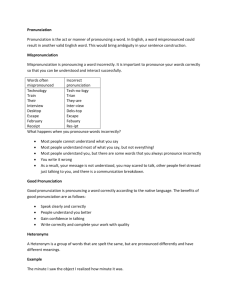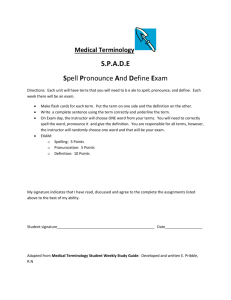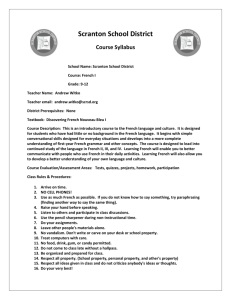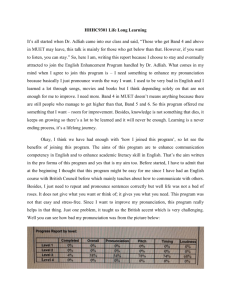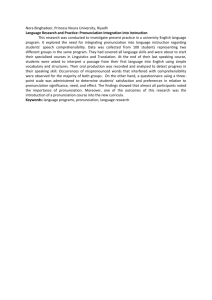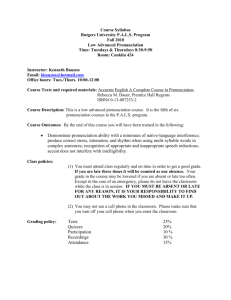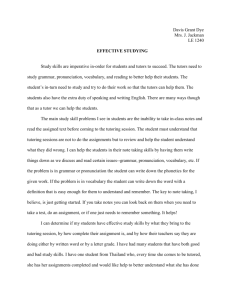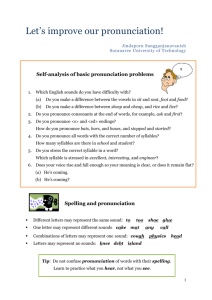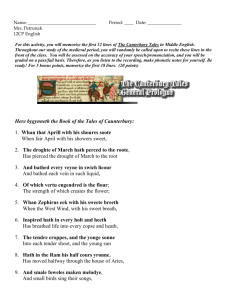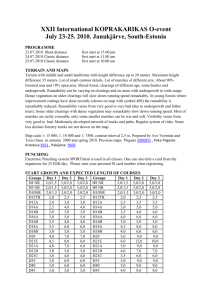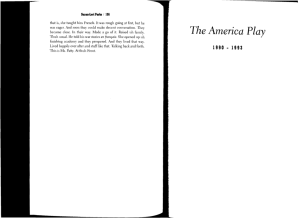Middle English Pronunciation Guide rev
advertisement
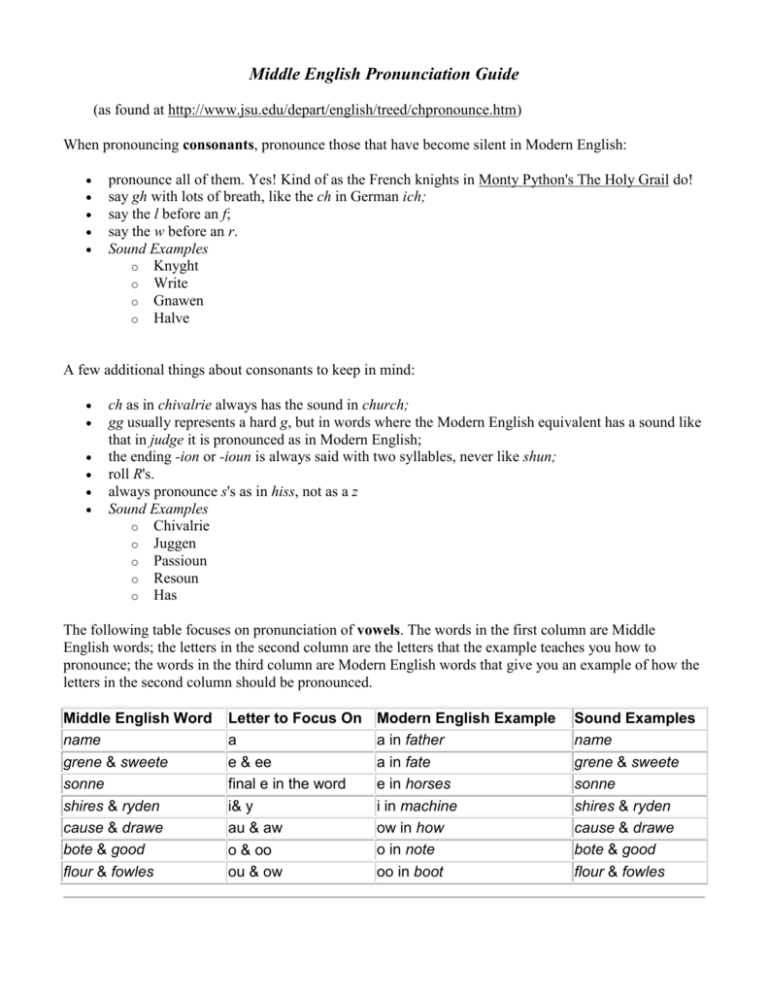
Middle English Pronunciation Guide (as found at http://www.jsu.edu/depart/english/treed/chpronounce.htm) When pronouncing consonants, pronounce those that have become silent in Modern English: pronounce all of them. Yes! Kind of as the French knights in Monty Python's The Holy Grail do! say gh with lots of breath, like the ch in German ich; say the l before an f; say the w before an r. Sound Examples o Knyght o Write o Gnawen o Halve A few additional things about consonants to keep in mind: ch as in chivalrie always has the sound in church; gg usually represents a hard g, but in words where the Modern English equivalent has a sound like that in judge it is pronounced as in Modern English; the ending -ion or -ioun is always said with two syllables, never like shun; roll R's. always pronounce s's as in hiss, not as a z Sound Examples o Chivalrie o Juggen o Passioun o Resoun o Has The following table focuses on pronunciation of vowels. The words in the first column are Middle English words; the letters in the second column are the letters that the example teaches you how to pronounce; the words in the third column are Modern English words that give you an example of how the letters in the second column should be pronounced. Middle English Word name grene & sweete sonne shires & ryden cause & drawe bote & good flour & fowles Letter to Focus On a e & ee final e in the word i& y au & aw o & oo ou & ow Modern English Example a in father a in fate e in horses i in machine ow in how o in note oo in boot Sound Examples name grene & sweete sonne shires & ryden cause & drawe bote & good flour & fowles The Pronunciation Project Pronunciation note: This doesn't follow a standard pronunciation system. Instead, I have tried to approximate this as much as I can to actual speech. Every time you see a bar over a letter, that gives you the long vowel sound. For example, ō is the same o that is found in goat. If I were to write goat in this guide for you to pronounce, I would write gō-t. The dash ( - ) is simply a reminder that all consonants are pronounced in Middle English, which is vastly different from Modern English. It is not a pause or glottal stop; it is just a reminder to enunciate. Aprill becomes Ah-prill here to show that you say the AH sound followed by prill, rather than making a sound out of 'ahp'. There are a few cases, such as eek (eke) that I use the closest English word that sounds the same. Note that in the case of eek, this doe not necessarily denote the meaning. Eek, in Middle English, means also. The one instance of Rr in this means to roll your R, like in Spanish. 'Thuh' is meant to keep you from pronouncing it "properly" as 'thē'. Chaucer's "The General Prologue" -- Lines 1-18 The Canterbury Tales tells the story of a group of people who are riding on a pilgrimage to the shrine of Thomas à Becket, a British martyr and saint, in Canterbury. Some of the people are: a priest, a clothmaking woman from just outside the town of Bath, a miller, two nuns, a knight, a sea captain, a doctor and a lawyer. Along the way, the pilgrims tell stories to entertain each other. Actual Text 1 2 3 4 5 6 7 8 9 10 11 12 13 14 15 16 17 18 Whan that Aprill with his shoures soote The droghte of March hath perced to the roote, And bathed every veyne in swich licour Of which vertu engendred is the flour; Whan Zephirus eek with his sweete breeth Inspired hath in every holt and heeth The tendre croppes, and the yonge sonne Hath in the Ram his half cours yronne, And smale foweles maken melodye, That slepen al the nyght with open ye (So priketh hem Nature in hir corages), Thanne longen folk to goon on pilgrimages, And palmeres for to seken straunge strondes, To ferne halwes, kowthe in sondry londes; And specially from every shires ende Of Engelond to Caunterbury they wende, The hooly blisful martir for to seke, That hem hath holpen whan that they were seeke. Approximate Pronunciation 1 2 3 4 5 6 7 8 9 10 11 12 13 14 15 16 17 18 Wah-n that Ah-prill with hiss shō-urs sō-tuh Thuh drog-tuh uh’ March hath pair-cèd to the rō-tuh, Ah-nd bah-thèd every vaī-n in switch lee-coor. Of which ver-tchoo engen-dred is the floo-ur. Wah-n Zeph-ee-rus ache with his swāt-uh brāth Inspeer-uhd hah-th in every halt and hāth. Thuh tan-druh crop-pess, ah-nd thuh yon-guh son-nuh Hahth in the Rrahm hiss hah-f course yuh-run-nuh, Ahnd smah-luh fool-ess mah-ken mel-o-dee-uh, Thaht slay-pin ahl the nee-ght with open ee-uh (So pree-keth him Nah-toor-uh in hear coo-rah-ges), Than long-en foke to gō-n on pilgrim-ah-gess, Ah-nd pahl-meh-ress for to seh-kin strounge strond-ess, Toh fair-ne hal-wess, couth in sahn-dree lahnd-es; Ah-nd spā-sh’lly from ā-vree sheer-ess enduf* Āngh-lond tuh Counter-bury they wend-uh, Thuh holly bless-ful mahr-tur fahr to sāke-uh, That hem hahth hawl-pin whah-n that they wear sāke-uh. 16r -- *enduf: "end of" slurred It's written small to show that its barely spoken -- the lines read together as a phrase "Ah-nd spa-sh’lly from ā-vree sheer-ess enduf Āngh-longd tuh Counter-bury they wend-uh."
